Hong Kong’s extradition bill is officially “dead,” but not dead enough for protesters
Hong Kong chief executive Carrie Lam said today (July 9) that the hated extradition bill which has drawn millions out onto the streets in protest “is dead,” and admitted that the government’s efforts to push it through had been a “total failure.”


Hong Kong chief executive Carrie Lam said today (July 9) that the hated extradition bill which has drawn millions out onto the streets in protest “is dead,” and admitted that the government’s efforts to push it through had been a “total failure.”
The much-maligned legislation, which would have allowed Hong Kong to send suspects to mainland China to face charges, sparked a massive wave of protests and presented the most dire challenge to the local government in decades. The latest mass demonstration took place on Sunday (July 7), when protesters flocked to the city’s tourist hotspots in a bid to spread their message to mainland Chinese visitors.
Lam had previously agreed to suspend the bill following violent clashes in mid-June between police and protesters. But the indefinite suspension of the law did not allay the fears and distrust of protesters, who insisted on the bill’s complete withdrawal. Her press conference today was the first since July 2, when she talked to journalists at 4 am following a particularly tense night of clashes between protesters and police at the legislature building.
While the word “dead” appears to be unequivocal enough, the question remains as to whether this actually amounts to a full withdrawal. In her Cantonese remarks (link in Chinese), Lam had used a phrase meaning “having reached the end of one’s life” to describe the status of the bill, suggesting a passive end to the legislation rather than an active effort to kill it off.
Some observers note that Lam’s steadfast refusal to officially withdraw the bill is a reflection of her arrogance.
Lam held firm in her refusal to set up an independent body to investigate allegations of excessive use of force by the police against protesters. However, she agreed to engage in “open dialogue” with student unions of local universities, backing down from her request earlier that those be closed-door discussions.
Lam also acknowledged that the political crisis was not merely an outpouring of popular anger against the extradition law, but reflected “fundamental and deep-seated problems in Hong Kong society” that cannot be ignored.